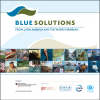Développement d’une capacité régionale en comptabilité du capital naturel des zones protégées en Afrique de l’Ouest

L’Afrique de l’Ouest se caractérise par une croissance démographique rapide, une pauvreté endémique ainsi qu’une mauvaise gouvernance et une piètre gestion des ressources naturelles. Cette situation est exacerbée par les effets négatifs du changement climatique et conduit sans équivoque à l’épuisement du capital naturel ouest-africain, y compris des écosystèmes dont la population est en grande partie tributaire.


